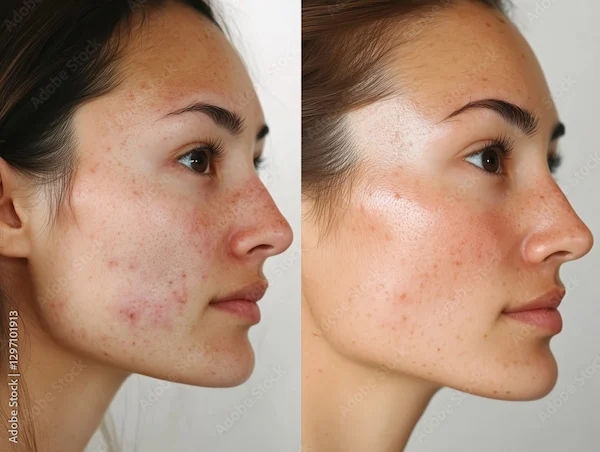How to Reduce Oil from Your Face?
Learn effective tips to reduce face oil and manage oily skin while maintaining a balanced complexion. Discover skincare routines and treatments for achieving healthier and clearer skin.

Written by
Last updated on 13th Jan, 2026
Oily skin is a common concern that many people experience at some point in their lives. Whether you're battling excessive shine or dealing with clogged pores that lead to acne, it can often be frustrating. But if you’re aware of what causes oily skin and adopt the right skincare, you can definitely regulate and lower the oil produced on your face.
Understanding Oil Production in Skin
Sebaceous glands produce oil in our skin naturally, which is called sebum. Sebum is vital as it ensures our skin is both hydrated and moisturised as well as protected from environmental pollutants and bacteria. However, an overproduction of sebum results in an oily complexion, which can cause clogged pores, blackheads, and acne.
Importance of Sebum for Skin Health
It is important to understand that sebum keeps your skin moisturised, prevents dryness, and also helps remove bacteria from your skin. However, excess sebum sometimes creates the appearance of shine, blocking the skin's pores and leading to acne. Hence, the goal is not to get rid of sebum, but rather to manage sebum’s production so that the complexion is balanced.
Causes of Oily Skin
Several factors contribute to oily skin, ranging from genetic predisposition to lifestyle choices. Understanding these causes can help you take the necessary steps to reduce excess oil.
- Genetics and Hormonal Changes
The oil production of your skin is strongly determined by your genetics. If your parents have oily skin, you may also likely develop oily skin. An increase in sebum production can also be caused by hormonal changes during puberty, menstruation, pregnancy, or the use of birth control. Usually, these changes result in greasy skin and acne breakouts.
- Environmental Factors
Oily skin is worsened by environmental conditions, such as humidity and temperature. Sebaceous glands produce more oil in hot and humid climates. Oil buildup can also lead to clogged pores and acne specifically in an environment with pollutants and dust.
- Diet and Lifestyle
Your diet and lifestyle choices can influence how much oil your skin produces. Excessive oil production can be a result of poor diets, high in refined sugars and unhealthy fats. Consuming a diet rich in fruits, vegetables, and healthy fats can help regulate oil production in the skin. On top of all that, poor sleep, stress, and being dehydrated can also lead to excess oil on face.
Daily Skincare Routine to Manage Oil
A consistent skincare routine tailored to oily skin is crucial to managing oil production. Below are some strategies to help you keep excess oil in check.
Step 1: Cleansing
Choose a gentle, foaming cleanser that removes dirt and excess oil without stripping the skin of essential moisture. Look for products containing salicylic acid or glycolic acid to help exfoliate the skin and unclog pores.
Step 2: Using Non-Comedogenic Products
Choose skincare and makeup products that are ‘non-comedogenic.’ These products are specifically formulated to not clog pores so as to prevent breakouts.
Step 3: Moisturising
If you have oily skin, hydrating it is an absolute must. Look for a lightweight, ungreasy moisturiser that is hydrating but does not cause a shiny appearance.
Effective Ingredients in Skincare for Oily Skin
Certain ingredients are particularly effective at controlling oil and treating oily skin, such as:
1. Salicylic Acid and Benzoyl Peroxide
Salicylic acid is a beta hydroxy acid (BHA) that penetrates deep into the pores to break down oil and debris that can contribute to acne. The second important ingredient is benzoyl peroxide, a common compound that is incorporated into acne treatment as it helps to extinguish acne-triggering microorganisms and decreases oil generation. Many over-the-counter treatments and face washes for oily skin contain both of these ingredients.
2. Clay Masks and Charcoal
Clay masks are a fantastic option for oily skin, as they draw out impurities, absorb excess oil, and provide a deep cleanse. Charcoal masks are another great alternative as they can help detoxify the skin by absorbing excess oil and unclogging pores.
3. Tea Tree Oil and Aloe Vera
Tea tree oil is also known for its antibacterial abilities that can help reduce oil and acne. Tea tree oil can be diluted with a carrier oil and applied to the face to help manage oily skin. Another natural ingredient that can soothe and calm the skin, reduce oil production, and inflammation is aloe vera.
Medical Treatments for Oily Skin
If your oily skin persists despite lifestyle changes and home remedies, there are medical treatments that can help.
- Prescription Medications and Topical Treatments
Prescription topical treatments containing retinoids, like tretinoin, can help regulate oil production and prevent clogged pores. Oral medications such as birth control pills may also help balance hormones and reduce excess oil production in women.
- Professional Procedures
Dermabrasion and chemical peels are professional treatments that can help exfoliate the skin and remove excess oil. These treatments can also improve skin texture and reduce acne scarring, providing long-lasting results for those with persistent oily skin.
Lifestyle Changes to Make to Address Oily Skin
Small lifestyle changes can go a long way. Follow the given lifestyle changes to manage oily skin:
- Reduce Stress: Cortisol is released when you are stressed, and this can cause more oil production. Practicing relaxation techniques like exercise, yoga, meditation, and deep breathing works for controlling stress levels.
- Prioritise Sleep: Quality sleep at night allows time for the body to repair itself and deal with hormone regulation issues, hence reducing excess oil production.
- Exercise Regularly: Physical activity will help improve blood circulation, which regulates hormones, ensuring healthy skin.
- Consume a Healthy Diet: Avoid eating too much sugary, processed, and fried foods as they can increase sebum production. Concentrate on eating a well-balanced diet of leafy greens, fruits and nuts, especially fats and omega-3s.
Conclusion
Managing oily skin is a gradual process that requires patience and consistency. By adhering to a regular skincare routine, making healthy lifestyle choices, and seeking medical treatments when necessary, you can reduce excess oil and achieve a balanced, clear complexion.
Incorporate ingredients like salicylic acid and clay masks into your routine and ensure your diet supports healthy skin. With time and effort, you can maintain a shine-free, healthy complexion.
Consult Top Dermatologist
Consult Top Dermatologist

Dr. S Madhuri
Dermatologist
10 Years • MBBS, MD. DVL, DNB, Fellow (Dermatosurgery & Lasers)
Secunderabad
Apollo Hospitals Secunderabad, Secunderabad
(350+ Patients)

Dr. Soumya Kanti Datta
Dermatologist
5 Years • MBBS, MD ( VD & L)
Kolkata
Foresight Clinic & Diagnostic, Kolkata
(175+ Patients)

Dr. Kaushiki Hajra
Dermatologist
5 Years • MBBS, MD Dermatology, Venerology & Leprosy
Kolkata
MCR SUPER SPECIALITY POLY CLINIC & PATHOLOGY, Kolkata

Dr. Sonal Jain
Dermatologist
9 Years • MBBS, MD Dermatology, Venerology & Leprosy
Kolkata
MCR SUPER SPECIALITY POLY CLINIC & PATHOLOGY, Kolkata
(25+ Patients)
Dr. Syeda Sarwath Saniya
Dermatologist
5 Years • MBBS,DVD
Bengaluru
Apollo Medical Center, Marathahalli, Bengaluru

